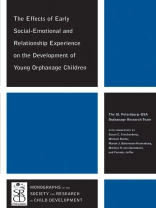Undertaken at orphanages in Russia, this study tests the role of early social and emotion experience in the development of children. Children were exposed to either multiple caregivers who performed routine duties in a perfunctory manner with minimal interaction or fewer caregivers who were trained to engage in warm, responsive, and developmentally appropriate interactions during routine care. Engaged and responsive caregivers were associated with substantial improvements in child development and these findings provide a rationale for making similar improvements in other institutions, programs, and organizations.
Tabela de Conteúdo
ABSTRACT.
I. THEORETICAL, EMPIRICAL, AND PRACTICAL RATIONALE.
II. BABY HOMES IN THE RUSSIAN FEDERATION.
III. RESEARCH DESIGN AND INTERVENTIONS.
IV. ASSESSMENTS.
V. EVIDENCE THAT THE INTERVENTIONS WERE IMPLEMENTED AS
PLANNED.
VI. CAREGIVER BEHAVIOR ON THE WARDS (HOME INVENTORY).
VII. ORPHANAGE STAFF ATTITUDES, PERCEPTIONS, AND FEELINGS.
VIII. INTERVENTION EFFECTS ON PHYSICAL GROWTH.
IX. THE EFFECTS OF THE INTERVENTION ON CHILDREN’S GENERAL
BEHAVIORAL DEVELOPMENT (BATTELLE DEVELOPMENTAL INVENTORY).
X. EFFECTS OF THE INTERVENTIONS OF CAREGIVER-CHILD
INTERACTIONS DURING FREE PLAY (PCERA).
XI. INTERVENTION EFFECTS ON CAREGIVER-CHILD INTERACTIONS
(INFANT AFFECT MANUAL, ATTACHMENT VARIABLES).
XII. SCIENTIFIC AND PRACTICAL CONCLUSIONS AND IMPLICATIONS.
REFERENCES.
ACKNOWLEDGMENTS.
COMMENTARY.
HOW VALID ARE THE RESULTS OF THE ST. PETERSBURG-USA
ORPHANAGE.
INTERVENTION STUDY AND WHAT DO THEY MEAN FOR THE WORLD’S
CHILDREN? (Susan C. Crockenberg)
INSTITUTIONAL EFFECTS ON CHILDREN: DESIGN ISSUES AND SUBSTANTIVE
FINDINGS (Michael Rutter).
EARLIER IS BETTER: A META-ANALYSIS OF 70 YEARS OF
INTERVENTION.
IMPROVING COGNITIVE DEVELOPMENT IN INSTITUTIONALIZED CHILDREN
(Marian J. Bakermans-Kranenburg, Marinus H. van IJzendoorn, and
Femmie Juffer).
CONTRIBUTORS.
STATEMENT OF EDITORIAL POLICY.
Sobre o autor
Susan C. Crockenberg is a Professor of Psychology at the University of Vermont. Her research focuses on the development of infants in families and other contexts, the mother-infant relationship, the role of temperament in development/psychopathology, and the development of emotion regulation in the first 3 years of life.
Michael Rutter is Professor of Developmental Psychopathology at the Institute of Psychiatry, King’s College, London. His research interests span a wide field but particularly focus on the developmental interplay between nature and nurture and the use of natural experiments to test causal hypotheses about genetic and environmental mediation of risk in relation to normal and abnormal psychological development. He is the recipient of numerous international awards and honors and has published over 40 books and over 400 scientific papers.
Marian J. Bakermans-Kranenburg is Full Professor at Leiden University, the Netherlands. She has been involved in studies on disorganized attachment, attachment in children with autism, attachment-based interventions, and stress regulation. She contributed to several meta-analyses, including attachment-based interventions, the Attachment Q-Sort, secondary traumatization, attention bias, and physical growth in adopted children. Her recent work has addressed the effects of gene-environment interaction and children’s differential susceptibility to childrearing influences.












